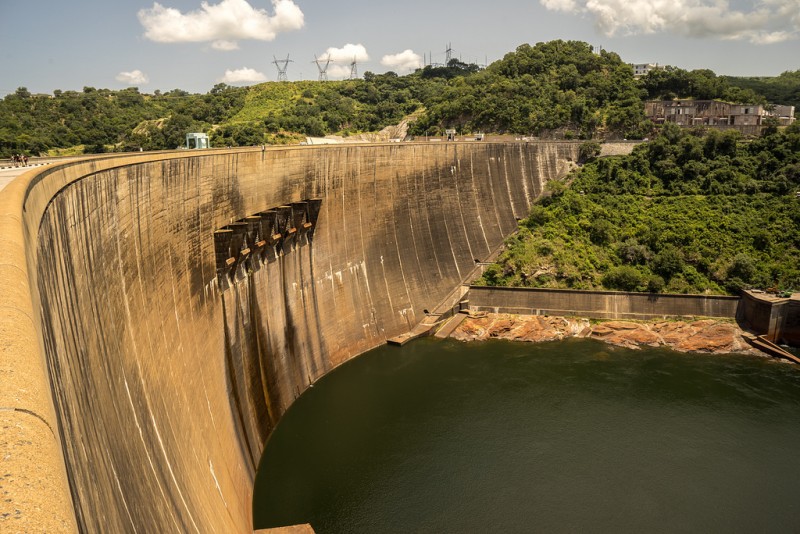A near-nationwide power outage hit Zambia earlier this year, knocking out electricity in both the capital in Lusaka and the Copperbelt mining region in the north. A few months later, the power utility company Zambia Electricity Supply Corporation, better known by the acronym ZESCO, introduced “load-shedding” throughout most of the country to ration the power supply.
The rationing of power has not only affected ordinary consumers, whose new struggles range from watching television to keeping groceries from spoiling, but is also hurting commercial enterprises that rely on electricity to operate. Some mining companies are even threatening to lay off workers, after ZESCO announced further reductions to the electricity it can supply to Zambia's mines.
Most of the country's electricity is generated at the Kariba Dam, on the Zambezi River bordering Zimbabwe, and at Kafue Gorge on the Kafue River, not far from Lusaka.
Some groups have expressed suspicions about the official reason offered for the energy cutbacks: low water levels at Lake Kariba and Lake Itezhi Tezhi, upstream of Kafue Gorge.
Edith Nawakwi, the leader of the Opposition Forum for Democracy and Development (and a former minister of energy in the 1990s), dismissed low water in the reservoirs as the reason for load-shedding, saying:
By the way this story that there is no what in the Kariba is just a story because I was Minister of Energy and I must remind people that in 1994 we had no rains for two consecutive years and we didn’t have this nonsense. The problem that we have now is that this government has made ZESCO a cash till were they walk in and collect money to pay government salaries and therefore when ZESCO needs cash to buy transformers and repairs have to be done they have no cash.
The non-governmental website Zambian Watchdog offered an entirely different reason for the large scale load-shedding, blaming the generators that were installed at both Kariba and Kafue Gorge during recent renovations.
Sino Hydro Power, the Chinese Company that the PF government engaged to upgrade and rehabilitate Kariba North Bank and Kafue Gorge power stations installed substandard, cheap equipment that have lower capacity than the original British made machines they found and replaced…. This is what is causing the load shedding, according to highly placed ZESCO and government officials.
Zambian Watchdog also quotes sources stating that the money used for the rehabilitation of the two power stations came from the 2012 Eurobond:
This company removed the British machines and components that were installed some years back. But instead of expanding the machine capacities, the specifications were changed due to corruption and Zambians were cheated that bigger machines were being installed yet they were of the lower capacity and substandard compared to the original machines. It’s like putting small tyres on a bigger vehicle carrying same or more load.
The ongoing load-shedding has increased the prices of charcoal and bread, according to the Facebook-based news forum Zambian Day:
The toll taken on Lusaka residents by the current power rationing by state power utility firm Zambia Electricity Supply Corporation (ZESCO) has not included vendors of Charcoal locally known as ‘Malasha’.
The vendors have increased the prices due to high demand. A 25kg bag that usually costs K35 [US$4.5] has been hiked to K40 [US$5.1] while a 90kg bag that normally fetches K120 [US$15.3] has gone up to K150 [US$19.2].Caught out in the power cuts have also been bakeries whose production schedules have been disturbed with production dipping posing a possible bread shortage that may translate in increased prices.
Those whose bakeries which lie in areas where load-shedding is at odd times have resorted to changing the working schedule of their workers to keep in business.Lusaka has been experiencing straight 8 hour power-cuts a day in the ongoing ZESCO load management attributed to low water levels in the Kariba Dam a main source for power generation in Zambia.
One Facebook user, Gift Tako Linyada Mbewe, added a humorous twist to the load-shedding, making ZESCO into the butt of the joke.
YOU ARE COMPLAINING ABOUT LOAD SHEDDING KANSI [when] IT IS WORSE WITH ZESCO ITSELF.
IF ZESCO HAD CONTINUED WITH 8 HOUR LOADING SHEDDING IT WAS NOT GOING TO PAY ITS WORKERS. PEOPLE HAD STOPPED BUYING UNITS.
LOAD SHEDDING IS HAMMERING ZESCO ITSELF HARDER THAN THE CONSUMERS. THEY HAVE REDUCED HOURS JUST TO RAISE ENOUGH FOR SALARIES AND OPERATION COSTS.
Zambia's power company has over time changed the way it sells electricity, especially to domestic consumers who now have to pre-pay for service. With load-shedding, many people have stopped buying electricity altogether, it seems.
Judging by what many are writing on social media today, significant numbers of Zambians have apparently resorted to gas for cooking and using generators for standby power. Some groups have also renewed efforts to get the government to remove the import duty on solar power equipment.








5 comments